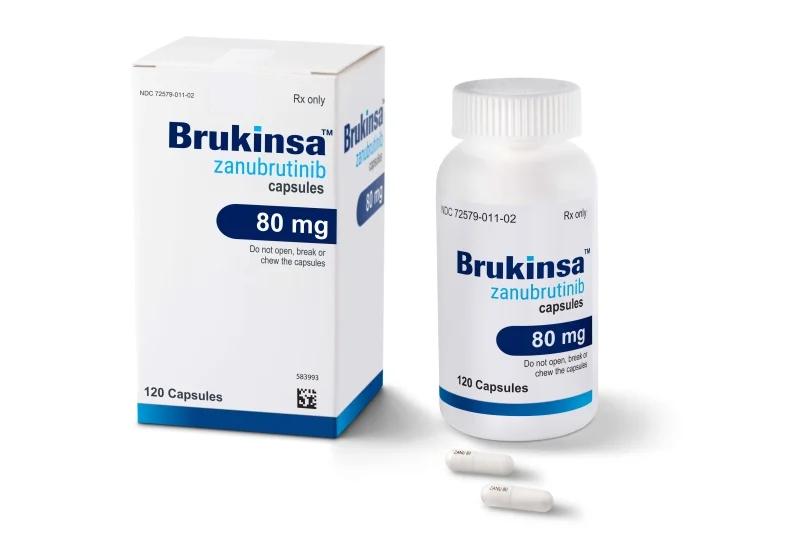- Center on Health Equity & Access
- Clinical
- Health Care Cost
- Health Care Delivery
- Insurance
- Policy
- Technology
- Value-Based Care
ALPINE: After 39 Months, Zanubrutinib Keeps Its PFS Edge Over Ibrutinib in R/R CLL, Especially for High-Risk Patients
Extended follow-up data presented at the American Society of Hematology show the advantage seen a year ago has held up for the second-generation Bruton tyrosine kinase inhibitor.
At 39 months, patients taking zanubrutinib after 1 prior treatment for chronic lymphocytic leukemia (CLL) or small lymphocytic leukemia retained a 32% edge in progression-free survival (PFS) over those taking ibrutinib, according to extended results of a phase 3 trial unveiled Saturday.
The findings were presented during the 65th American Society of Hematology (ASH) Annual Meeting and Exposition, taking place in San Diego, California.
Zanubrutinib, a second-generation Bruton tyrosine kinase (BTK) inhibitor, sustained its advantage over ibrutinib in the latest findings, which come a year after final results from the ALPINE trial (NCT03734016) were presented at ASH in New Orleans. Those data showed zanubrutinib offered a 35% PFS advantage over ibrutinib after an average of 29.6 months.
zanubrutinib (Brukinsa) | Image credit: BeiGene

Sold as Brukinsa, zanubrutinib is made by BeiGene and approved for treatment of CLL and SLL based on results of the ALPINE and SEQUOIA trials. It is also approved to treat certain patients with mantle cell lymphoma, marginal zone lymphoma, and Waldenström's macroglobulinemia.
If there was a lingering question from ALPINE, it was whether that edge for zanubrutinib would last beyond 2 years, lead investigator Jennifer R. Brown, MD, PhD, of Dana-Farber Cancer Institute told The American Journal of Managed Care® in an interview this week. The head-to-head ALPINE trial has been compared with the ELEVATE-RR trial, which evaluated ibrutinib against acalabrutinib over 36 months, she said.
The extended ALPINE data showed that benefits were also sustained for the highest-risk patients, those with 17p deletion and TP53 mutation, where zanubrutinib holds an even greater advantage over ibrutinib.
“I think people have been very eager to see whether the benefit of zanubrutinib holds up at this year's follow up, which is 39 months. And as you can see from the abstract it does,” Brown said in the interview.
In addition, the data at 39 months show a trend toward an overall survival advantage for zanubrutinib over ibrutinib, but the results did not reach statistical significance.
Improved Mechanism of Action
Brown explained that compared with ibrutinib and acalabrutinib, zanubrutinib has higher concentration ratios and thus offers more complete inhibition of BTK; also, unlike the others, it has no active metabolite on kinases beyond BTK, so it produces fewer off-target effects.
ALPINE was designed to evaluate zanubrutinib’s efficacy and safety head-to-head against ibrutinib, the first-generation BTK inhibitor which reached the market in 2014 for patients who had received at least 1 prior therapy for CLL. The study compared 327 patients taking zanubrutinib with 325 taking ibrutinib; results published in last year in the New England Journal of Medicine showed a hazard ratio (HR) for PFS of 0.65 (95% CI, 0.49 to 0.86; P = .002).
Those data showed that among patients with a 17p deletion, a TP53 mutation, or both, the zanubrutinib group had longer PFS than those taking ibrutinib (HR 0.53; 95% CI, 0.31 to 0.88).
New Data Show Advantage Is Sustained
At 39 months, 194 patients from the zanubrutinib group (59%) are still undergoing treatment, compared with 152 patients in the ibrutinib group (47%). There have been 51 patients with disease progression in the zanubrutinib group, compared with 62 in the ibrutinib group.
Data at the 39-month mark are as follows:
- Zanubrutinib retained its PFS advantage over ibrutinib, HR 0.68; 95% CI, 0.53-0.86; P = .001
- The advantage held up across all subgroups; notably zanubrutinib offered a 63% PFS advantage for patients who had received more than 3 prior lines of therapy.
- Responses deepened over time, and sensitivity analyses showed these results were driven by efficacy, not the drug’s tolerability.
- Zanubrutinib’s edge was sustained among the highest-risk patients with a 17p deletion and TP53 mutation (HR 0.52; 95% CI, 0.33-0.83).
- Overall survival results favored zanubrutinib, 64 events to 78 events, but did not reach significance; HR 0.75; 95% CI, (0.54-1.05), P = .098.
Jennifer R. Brown, MD, PhD, Dana-Farber Cancer Institute | Image credit: DFCI

Brown discussed the findings for the highest-risk patients and explained why they speak to the drug’s efficacy.
“These are the patients who are particularly poorly served historically by chemotherapy, and d so the development of the BTK inhibitors was particularly revolutionary for them. That’s a group that we're always particularly interested in looking at the outcomes for,” she explained.
“We actually see an even bigger difference benefiting zanubrutinib have compared to ibrutinib than we do in the overall population,” Brown continued. “And at this time point, we have 59% of patients still progression-free on zanubrutinib, compared to 41%, with ibrutinib. So that's an 18% improvement in the progression free survival at 39 months for this very high-risk subgroup.
“I think the fact that we see an even bigger difference in this subgroup compared to the total population underscores the fact that it's likely a real efficacy difference that we're seeing driving the results of the trial, because this is the group where difference in efficacy should be most pronounced,” Brown said. “The fact that we're seeing it there in particular, even more so than the overall population, I think is very convincing.”
Safety Results, Potential Health Savings
Beyond the efficacy findings, the extended follow-up also showed superior safety findings for zanubrutinib. A key advantage of second-generation BTK inhibitors over ibrutinib is a reduction in cardiac effects; at 39 months, the differences in ALPINE were significant:
- The zanubrutinib group saw 80 cardiac events (24.7% of the original group), compared with 112 events (34.6%) for ibrutinib.
- Zanubrutinib patients had 11 serious cardiac events, compared with 31 for ibrutinib.
- 3 patients stopped taking zanubrutinib due to cardiac issues, compared with 15 for ibrutinib.
- The zanubrutinib group saw 22 atrial fibrillation/flutter events (6.8% of patients), compared with 53 in the ibrutinib group (16.4%).
- An exploratory analysis suggests the increase in hypertension over time is greater in ibrutinib than zanubrutinib.
Given that patients with CLL may take a BTK inhibitor for several years, what are the implications of these cardiac results for the health system?
“Based on ALPINE, Brown said, “We did look into the rates of hospitalization at this follow up for zanubrutinib vs ibrutinib, and it's actually a 10% lower rate [for zanubrutinib]. So, 46% of patients on zanubrutinib were hospitalized for some reason over the course of the trial versus 56% for ibrutinib. That's a pretty significant difference,” she said. “So, it looks like it's translating into benefits for the healthcare system as well.”
Similarly, Brown was asked if the cardiac safety differences become more important over time. This does become significant she said that this does become significant when one looks at atrial fibrillation and arrhythmia rates, “because we know those are continually increasing and the cumulative incidence just goes up.”
Quality of Life Over Time
Cardiac events are not the only adverse effects (AEs) patients taking BTK inhibitors may experience. Brown was asked if there are other AEs that should be considered if the time horizon for taking the medication will be more than 3 years, as payers are wary if patients may stop taking a drug due to to side effects. Brown said zanubrutinib has an advantage here, too.
“There are a number of side effects which are typically much more common with ibrutinib than zanubrutinib,” she said, listing rashes, joint aches, and diarrhea. “Fatigue related to the drug is something we also see with ibrutinib.”
“People can tolerate it for 6 months or even a year, but then you're getting to 3 and 4 years, it's forever,” she said. Although these symptoms may be considered grade 1 or 2 clinical trial criteria versus grade 3 or 4, they become more significant to patients if they continue over a long period of time.
“I think this is why especially with the ibrutinib trials, we tend to see patients going off [the drug] as you get to 3, 4, 5, 6 years. I think that’s going to be much less true with zanubrutinib,” Brown said. “My patients have told me they don’t even know they’re taking anything. Now that's usually fairly soon after they start, but it still tends to stay similar.”
Reference
Brown JR, Eichhorst B, Lamanna N, et al. Extended follow-up of ALPINE randomized phase 3 study confirms sustained superior progression-free survival of zanubrutinib versus ibrutinib for treatment of relapsed/refractory chronic lymphocytic leukemia and small lymphocytic lymphoma (R/R CLL/SLL). Presented at: 65th American Society of Hematology Annual Meeting & Exposition; December 9-12, 2023; San Diego, California; Paper No. 0202. https://doi.org/10.1182/blood-2023-174289
The Importance of Examining and Preventing Atrial Fibrillation
August 29th 2023At this year’s American Society for Preventive Cardiology Congress on CVD Prevention, Emelia J. Benjamin, MD, ScM, delivered the Honorary Fellow Award Lecture, “The Imperative to Focus on the Prevention of Atrial Fibrillation,” as the recipient of this year’s Honorary Fellow of the American Society for Preventive Cardiology award.
Listen
